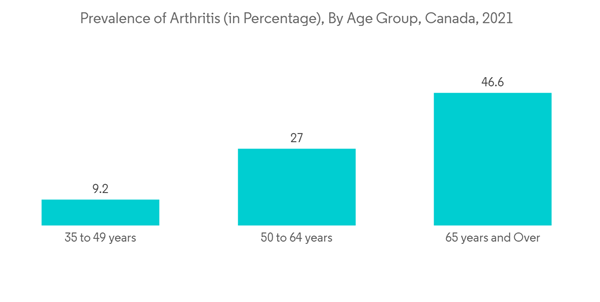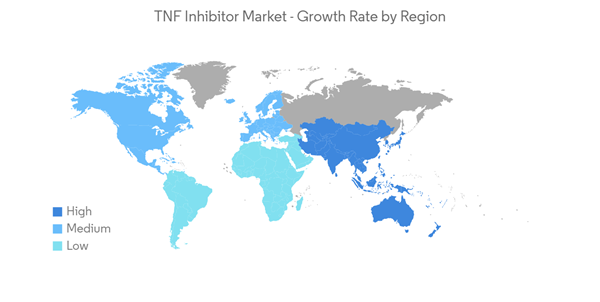COVID-19 had an unprecedented impact on the market's growth due to disruption in the supply chain across the globe. TNF inhibitors found large applications in the treatment of COVID-19, thereby impacting the demand. For instance, the Journal of American Medical Association article published in October 2021 concluded that TNF inhibitor monotherapy was associated with a lower risk of adverse COVID-19 outcomes compared with other commonly prescribed immunomodulatory treatment regimens among individuals with immune-mediated inflammatory diseases. Thus, studies that demonstrate the effectiveness of the TNF monotherapy treatment in COVID-19 patients had a significant impact on the growth of the market. In addition, the demand for TNF inhibitors during the post-pandemic period is expected to remain intact due to the emergence of various mutant strains of the SARS-CoV-2 virus and the rising focus on auto-immune disease treatments, thereby contributing to the growth of the market over the forecast period.
The major factors attributing to the growth of the market are the rise in the global prevalence of autoimmune disorders such as (RA) Rheumatoid Arthritis, Inflammatory Bowel Disorder, Psoriasis, and Crohn’s disease coupled with the increase in the aged population. For instance, As per the International Foundation for Gastrointestinal Disorders (IFFGD) report published in 2021, around 10 to 15% of the population is affected by irritable bowel syndrome worldwide, including approximately 25 to 45 million people suffering from the disease in the United States. Also, according to a report by the CDC published on World IBD Day in April 2021, the number of people affected by IBD was around 7 million worldwide annually. The report also stated that the rate of prevalence of the disease significantly increased during the last two decades. Such increasing incidences of various auto-immune diseases are expected to drive the demand for effective treatment and therapeutics such as TNF inhibitors, thereby contributing to the market's growth over the forecast period.
Furthermore, the approval of the products by the regulatory authorities to provide safe and effective therapeutics also contributes to the market's growth. For Instance, in December 2021, Coherus BioSciences, Inc. received United States FDA approval for YUSIMRY (adalimumab-aqvh), formerly CHS-1420, a Humira (adalimumab) biosimilar product. YUSIMRY is indicated for plaque psoriasis, psoriatic arthritis, rheumatoid arthritis, juvenile idiopathic arthritis, ankylosing spondylitis, Crohn’s disease, and ulcerative colitis.
Thus, owing to the abovementioned factors, the market is anticipated to project growth over the forecast period. However, the high risk of complications coupled with challenges while in the development stage and expensive patented biologics may hinder the market's growth.
TNF Inhibitors Market Trends
Rheumatoid Arthritis Segment Is Expected to Project Large Growth Over the Forecast Period
Rheumatoid Arthritis (RA) is an autoimmune condition in which the immune system of the own body attacks the healthy tissues of the body. Biologic drugs work by targeting proteins called cytokines, which are responsible for the inflammation caused by the immune system’s response. In the case of ‘anti-TNF’ drugs, the cytokines being targeted are known as ‘TNF’ (TumourNecrosis Factor alpha). The factors such as the growing burden of RA disease, approval of drugs by the regulatory authority, and the launch of products by the market players are propelling the growth of the market segment over the forecast period.The growing burden of rheumatoid arthritis is largely propelling the growth of the market segment. According to the Global RA Network report 2021, more than 350 million people were living with arthritis around the world in 2021, and its burden is expected to increase owing to various factors, one of which is the rising burden of the geriatric population around the globe. Such a high prevalence of rheumatoid arthritis is also boosting the growth of the studied market.
Additionally, the approval of drugs by different regulatory authorities of the region and the launch of products is expected to drive the growth of the studied segment. For instance, in March 2021, Samsung Bioepis launched its adalimumab biosimilar Hadlima in Australia in partnership with Merck & Co. Hadlima is approved for the treatment of rheumatoid arthritis and other indications in Australia. Such launch of anti-TNF biosimilars for the treatment of rheumatoid arthritis is propelling the growth of the market segment.
Thus, owing to the abovementioned factors, the market segment is expected to project significant growth over the forecast period.
North America is Expected to Witness a Growth in the Market Over the Forecast Period
North America is expected to hold a major market share in the overall TNF inhibitors market throughout the forecast period. The dominance is expected due to several factors, such as well-established direct reimbursement policies and the availability of advanced healthcare infrastructure in the region.The growing burden of autoimmune diseases in different countries worldwide is also propelling the market's growth. For instance, in 2022, the Crohns and Colitis Foundation report mentioned that Crohn's disease and ulcerative colitis affected 1.6 million Americans, most of whom are aged before 35. Similarly, the Government Statistics Canada data published in August 2022, the number of arthritis in Canada in 2021 was 6,087,600. Such a high prevalence of autoimmune disorders in North American countries is expected to drive the demand for effective therapeutics, thereby boosting the market growth in this region.
Also, the accelerating product approval procedure by regulatory authorities in North America is expected to propel the market's growth in the region. For instance, in February 2022, Pfizer Inc. received United States Food and Drug Administration (FDA) acceptance for review of the Prior Approval Supplement (PAS) to the Biologics License Application (BLA) for ABRILADA (adalimumab-AFB) as an interchangeable biosimilar to Humira (adalimumab).
Thus, owing to the abovementioned factors, such as the rising prevalence of autoimmune disorders and the presence of key market players along with frequent product launches, the North American region is expected to show lucrative growth over the forecast period.
TNF Inhibitors Market Competitor Analysis
The TNF Inhibitors Market is moderately competitive and consists of several major players. In terms of market share, a few of the major players are currently dominating the market. Some prominent players are acquiring other companies to consolidate their market positions across the globe and while others are launching new products. Some companies currently dominating the market are Abbvie Inc, Pfizer Inc, Johnson & Johnson, Amgen Inc, and UCB Inc.Additional benefits of purchasing the report:
- The market estimate (ME) sheet in Excel format
- 3 months of analyst support
This product will be delivered within 2 business days.
Table of Contents
Companies Mentioned (Partial List)
A selection of companies mentioned in this report includes, but is not limited to:
- UCB Inc
- Pfizer Inc
- Amgen Inc
- AbbVie Inc
- Johnson & Johnson
- F. Hoffmann-La Roche AG
- Boehringer Ingelheim Pharmaceuticals
- Novartis International AG
- Merck kGaA
- Lupin
- Sanofi
- Bristol-Myers Squibb Company
- Cadila Healthcare Ltd










